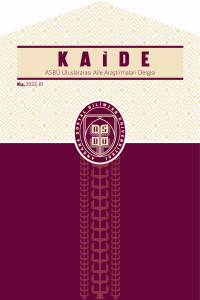Öz
Bu makale, rol kavramın inşasını Kur’ân’ın içinden izleyerek, Müslüman aile içindeki tezahürünü sosyolojik olarak beş rolde ele almaktadır: istikrar, yeniden yapılanma, reform, liderlik ve tanıklık. İki tamamlayıcı döngü çerçevesinde işlevlerin dallanması ifadesi, ailenin velayet ve muhafazakarlık döngülerinin bütünleşmesiyle yapısı kurulan tek bir varlık olarak tanımlanmasını çözer. Makale ayrıca pozitivist sistemdeki rol unsurlarının arzu ve doğal hak felsefesine dayalı olarak ve Allah’a ibadete dayalı meşru sistem ile köle anlaşmazlığı arasında birleştirilmesinin imkansızlığını da vurgulamaktadır.
Anahtar Kelimeler
Kaynakça
- Al-Ak, K. A. (2001). Building the Muslim Family in the Light of the Qur’an and Sunnah, Dar Al-Maarif, Beirut, Lebanon, 4th Edition.
- Ahmad, A. (1990). Building A Virtuous Family. Dar Al-Bayan Al-Arabi Lebanon-Al-Irfan Library Kuwait.
- Ahmad b. Hanbel, Musnad.
- Badawi, A. Z. (1993). Social Sciences Terminology Dictionary. Lebanon Library, Beirut.
- Baghawai, Tafsir al Baghawai.
- Al-Bayhaqi, (1176). Sunan. (Publication house not available).
- Al-Bukhari, M. b. İ. (Publication date not available). Al-Adab Al-Mufrad.
- Al-Hakim, Al-Mustadrak on the Sahihain.
- Hejazy, M. Psychology of the Oppressed Man.
- Kouzes, J. & Posner, J. (Publication date not available). Leadership Challenges, Fifth Edition, Jarir Publication House.
- Lipset &Bendix, “Class Status and Power,” as well as research papers by C. Wright Mills, especially “Power Elite.”
- Al-Maraghi, A. M. Tafsir Al-Maraghi.
- Moufid, K. (2018). “Family Roles between the Qur’anic System and the Secular System,” Doctoral Thesis, Moulay Slimane University, Faculty of Arts and Humanities, Beni Mellal, Publisher, Center for Family Studies and Research in Values and Law, First Edition.
- Muhammad Rashid, b. A. R. (1990). Tafsir Al-Manar. General Egyptian Book Organization.
- Muslim, Sahih Al-Muslim
- Ibn Manzur, Lisan al-Arab.
- Al- Isfahani, R. Vocabulary of the Qur’an.
- Al-Asfahani, Qur’anic Lexis.
- Al-Ici, A. b. M. Jami’ al-Bayan fi Tafsir al-Qur’an.
- Al-Qurtubi, Al-Jami` fi Ahkam al-Qur’an.
- Rashid Rida, M. (1990). Tafsir Al-Menar. Egyptian General Book Authority.
- Rida, R. Women’s Rights in Islam.
- Rothschild, C. S. (1970). The Study of Family Power Structure: A. Review 1960 -1969) Journal of Marriage and the Family. 32. pp. 539-552.
- Sabri, M. Quality Criteria in Family Management in the Qur’an, Dar Al-Bashir for Culture and Sciences.
- Suyuti, Al-Jami Al-Saghir.
- The Holy Qur’an
- Al-Tirmidhi. Sunan. Daru Ibn Kathir.
Öz
The article deals with the concept of the family role in its sociological sense by tracing the constructions from Qur’an. We trace five existential roles within the Muslim family: stability, reconstruction, reform, leadership, and testimony. The statement of the branching of functions in the framework of two complementary cycles resolves the identification of the family as a single entity whose structure is established by the integration of the cycles of guardianship and conservatism. The article also highlights the impossibility of combining the elements of the role in the positivist system based on the philosophy of desire and natural right, and between the legitimate system based on the worship of God and the slave dispute.
Anahtar Kelimeler
Kaynakça
- Al-Ak, K. A. (2001). Building the Muslim Family in the Light of the Qur’an and Sunnah, Dar Al-Maarif, Beirut, Lebanon, 4th Edition.
- Ahmad, A. (1990). Building A Virtuous Family. Dar Al-Bayan Al-Arabi Lebanon-Al-Irfan Library Kuwait.
- Ahmad b. Hanbel, Musnad.
- Badawi, A. Z. (1993). Social Sciences Terminology Dictionary. Lebanon Library, Beirut.
- Baghawai, Tafsir al Baghawai.
- Al-Bayhaqi, (1176). Sunan. (Publication house not available).
- Al-Bukhari, M. b. İ. (Publication date not available). Al-Adab Al-Mufrad.
- Al-Hakim, Al-Mustadrak on the Sahihain.
- Hejazy, M. Psychology of the Oppressed Man.
- Kouzes, J. & Posner, J. (Publication date not available). Leadership Challenges, Fifth Edition, Jarir Publication House.
- Lipset &Bendix, “Class Status and Power,” as well as research papers by C. Wright Mills, especially “Power Elite.”
- Al-Maraghi, A. M. Tafsir Al-Maraghi.
- Moufid, K. (2018). “Family Roles between the Qur’anic System and the Secular System,” Doctoral Thesis, Moulay Slimane University, Faculty of Arts and Humanities, Beni Mellal, Publisher, Center for Family Studies and Research in Values and Law, First Edition.
- Muhammad Rashid, b. A. R. (1990). Tafsir Al-Manar. General Egyptian Book Organization.
- Muslim, Sahih Al-Muslim
- Ibn Manzur, Lisan al-Arab.
- Al- Isfahani, R. Vocabulary of the Qur’an.
- Al-Asfahani, Qur’anic Lexis.
- Al-Ici, A. b. M. Jami’ al-Bayan fi Tafsir al-Qur’an.
- Al-Qurtubi, Al-Jami` fi Ahkam al-Qur’an.
- Rashid Rida, M. (1990). Tafsir Al-Menar. Egyptian General Book Authority.
- Rida, R. Women’s Rights in Islam.
- Rothschild, C. S. (1970). The Study of Family Power Structure: A. Review 1960 -1969) Journal of Marriage and the Family. 32. pp. 539-552.
- Sabri, M. Quality Criteria in Family Management in the Qur’an, Dar Al-Bashir for Culture and Sciences.
- Suyuti, Al-Jami Al-Saghir.
- The Holy Qur’an
- Al-Tirmidhi. Sunan. Daru Ibn Kathir.
Ayrıntılar
| Birincil Dil | İngilizce |
|---|---|
| Konular | Aile Sosyolojisi |
| Bölüm | Araştırma Makalesi |
| Yazarlar | |
| Yayımlanma Tarihi | 31 Aralık 2023 |
| Gönderilme Tarihi | 11 Aralık 2023 |
| Kabul Tarihi | 28 Aralık 2023 |
| Yayımlandığı Sayı | Yıl 2023 Cilt: 1 Sayı: 1 |

